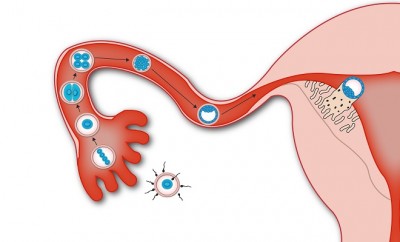Any woman planning on getting pregnant is always watching out for signs of implantation. It is possible to know if implantation has occurred even before you miss your monthly period. If you want to know whether you are pregnant within the first days of implantation, you should keep an eye on your BBT, be keen on your mood swings and any food cravings. You can also wait to see implantation signs like spotting, cramping among other well-known signs of implantation.

10 Possible Signs of Implantation You Will Want to Know
1. Spotting
Implantation bleeding, popularly known as spotting, is one of the key symptoms of ovulation. However, if it takes place around 7 to 10 days after ovulation, then it might be a sign that a fertilized egg has been implanted. This is caused by the embedment of the embryo into the wall of the uterus. Implantation bleeding is usually pinkish and scanty unlike normal period which is red and heavy.
2. Cramping
Implantation cramping normally resembles menstrual cramps. In fact, most women cannot tell them apart. Implantation cramps usually occur around the back and lower abdomen, and last for about 2 days. As a normal occurrence, implantation cramps are caused by the continual contraction of the walls of the uterus during embedment of the embryo. Nevertheless, intense cramping can at times be a sign of a serious health condition. See a doctor should the cramps become unbearably painful.
3. High Basal Body Temperature
Basal body temperature (BBT) can be one of the signs of implantation. A good example is the BBT rises to a 3rd level of temperatures (triphasic) or the BBT decreases in about one week after ovulation. If you regularly take temperatures and chart your cycle, you will notice BBT tends to remain high during the luteal phase. This is caused by the increase of progesterone when you're ovulating. If implantation has occurred, temperatures stay elevated.
4. Tenderness of the Breasts
This is among the most common signs of implantation and can be associated with swelling and soreness of the breasts. When implantation occurs, your breasts will be ready for the task ahead - feeding and nourishing the baby. This symptom can be due to two hormones, estrogen and progesterone, which also increasesthe sensitivity of the breasts. Blood flow is also increased to the breast and can also cause sensitivity and tenderness.
5. Frequent Urination
You might experience an increased urge to urinate a week after implantation. While you might find yourself rushing to the bathroom every hour, you will pass very little urine. This is normally caused by the secretion of the hCG hormone by the embryo after it has attached itself to the walls of the uterus. HCG increases blood supply to the pelvic area making your bladder very irritable.
6. Hot Flushes
While hot flushes are not a clear indicator of implantation, many women experience them on the day of implantation. They normally last up to 50 minutes. Hormone levels tend to fluctuate at the time of implantation. This is believed to cause hot flushes. Experiencing hot flushes is not one of the reliable signs of implantation, unless it's accompanied by other symptoms mentioned in the article.
7. Aversions and Food Cravings
During ovulation, some women have their sense of taste and smell enhanced. The same happens after implantation. Women will often experience food cravings and will want to try out new kinds of foods.
8. Fatigue
After fertilization, implantation causes the body to overwork during this period of attaching the fertilized egg to the uterine walls. If your schedule has not changed at all but you are experiencing fatigue, thechances are you are pregnant.
9. Mood Swings
The increased level of hormones in the body can cause mood swings. If you notice that you have suddenly become emotional or short tempered, implantation might have already occurred.
10. Headaches
Headaches can be caused by a variety of other health conditions and physical reasons like stress or getting cold. However, if you get a combination of the symptoms above and headaches, chances are that you will be a mom soon.
Do I Need to Take a Pregnancy Test?
Though knowing the sings of implantation, you may not be 100% sure of the pregnancy. The signs mentioned above could be indications of other medical problems, not necessarily pregnancy. Therefore, if you have been engaging in unprotected sex and wonder if you might be pregnant, you can do a test on your own.
Buy a home pregnancy test kit immediately after you miss your period. A pregnancy test kit captures the level of hCG (human chorionic gonadotropin), which sky rockets after implantation. You should get positive results when you use a urine test kit 2 to 3 days after implantation and 3 to 4 days when you use a blood test. A pregnancy test is the only sure way of knowing whether or not you are with child. If the result is negative, you can try after a few days or weeks.
All the best!
